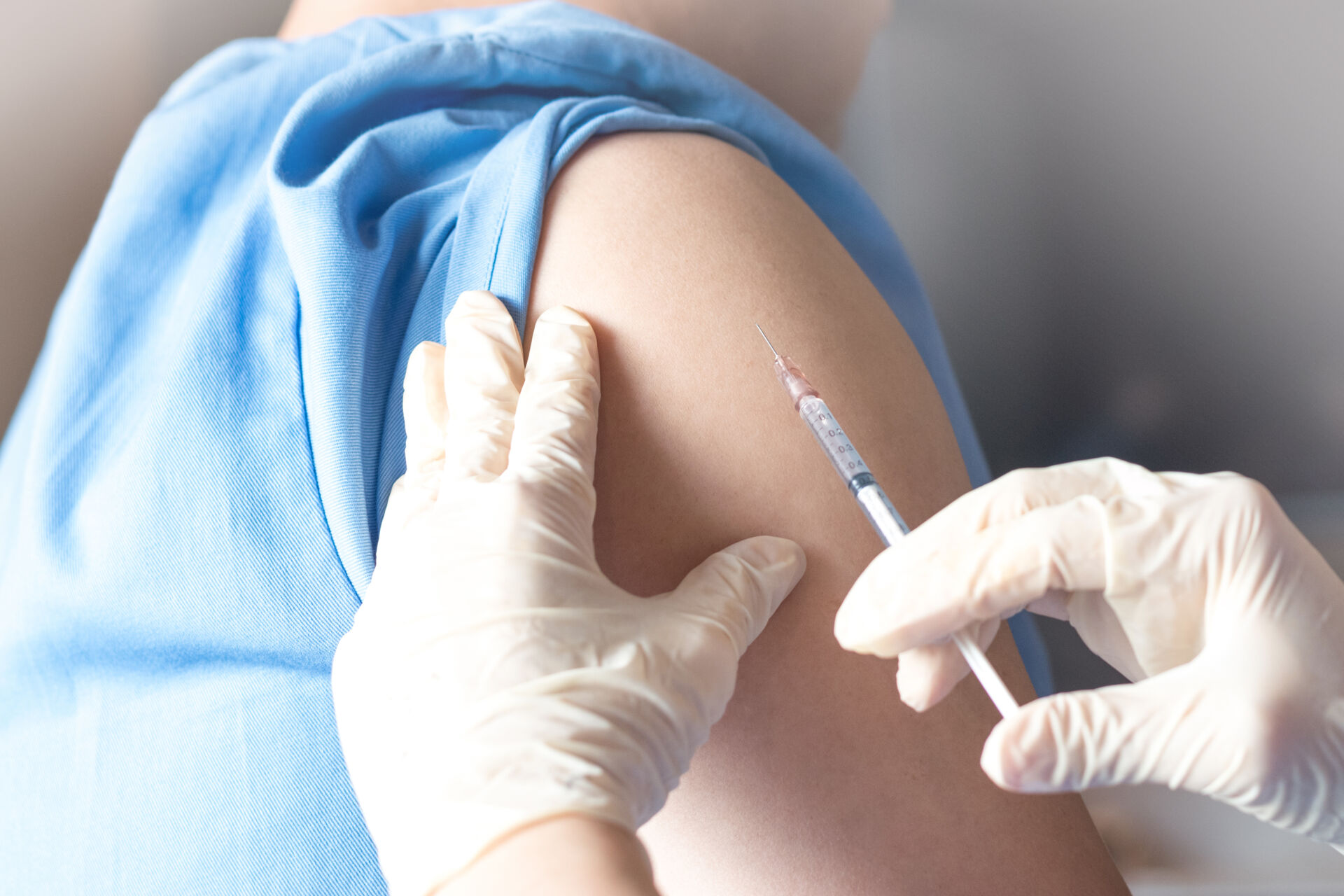Use of Vaccines in Controlling Infectious Diseases

The knowledge of vaccines becomes very important for all healthcare workers, especially after the development of the Covid 19 vaccine. This vaccine not only has reduced the rate of covid infections but has also declined the hospitalization & deaths amongst the immunized population.
Immunity is the ability of the human body to protect itself from infectious diseases. It has two parts: innate (natural) and adaptive (1). Innate immunity is a fast acting, non-antigen specific type; first line of defense (physical and chemical barriers, phagocytosis, and inflammation; 2). The adaptive immune system is an antigen specific defense mechanism and is obtained either by the wild infection or from vaccine (immunization; 3). The available vaccines are of different types: live attenuated, inactivated, subunit & nucleic acid vaccines. The recommended vaccines for the infectious diseases along with their clinical features are discussed here (4, 5, 6, 7):
1) Cholera and Traveller’s Diarrhea: Cholera (acute diarrheal infection) caused by Vibrio Cholera bacterium and traveler’s diarrhea (caused by Escherichia Coli) are transmitted by contaminated food and water. Dukoral vaccine (2 or 3 doses followed by booster dose) used to prevent these diseases is recommended for 2 years of age and older.
2) Diphtheria: It is an acute, communicable disease (pharyngitis with fever) caused by Corynebacterium diphtheria. The vaccine (diphtheria toxoid vaccine, DTaP & Tdap) is administered in 4 doses (3 doses +1 booster dose) to children (2 months to <18 years), whereas for adult only 1 dose + 1 booster dose is recommended.
3) Haemophilus influenza: It is a bacterial disease (meningitis & fever), most predominant in infants and young children. Haemophilus influenza type B (Hib) vaccine is provided in 4 doses series (2 months to 4 years age of children).
4) Hepatitis A: It is a viral infection of liver (inflammation) and most frequently transmitted by the faecal-oral route. Hepatitis A vaccine (Havrix; 2 doses) is given to travellers visiting to hepatitis A endemic countries.
5) Hepatitis B: It is a viral infection (abdominal pain, anorexia & jaundice) caused by hepatitis B virus which is transmitted through contact with infected body fluids. The hepatitis B vaccine (combined) is usually given as 3 doses to infants as a part of routine immunization in Canada.
6) Human Papillomavirus (HPV): It is the most common sexually transmitted infection (anogenital warts, cervical, anal, vaginal & penile cancer). HPV vaccine (2-3 doses) is given to 9-15 years (part of school-based program) & >15 years in Canada.
7) Influenza (flu): The flu (respiratory infection with or without fever) is caused by influenza A & B viruses and occurs in Canada every year during fall & winter months. The flu vaccine should be offered annually to anyone 6 months and older (if not contraindicated).
8) Japanese Encephalitis (JE): It is a viral infection (fever, headache, vomiting) caused by mosquito bite, occurring only in certain countries in Asia. JE vaccine is recommended for adult travelers going to JE endemic/pandemic areas during transmission season.
9) Measles: It is a contagious type of infection (fever, aches, rashes) caused by paramyxovirus. The measles vaccine (combination type) such as measles-mumps-rubella (MMR) or measles-mumps-rubella-varicella (MMRV) is recommended for routine immunization of children & adolescents in 2 doses.
10) Meningococcal Disease: This disease (fever, stiff neck) caused by Neisseria meningitidis (bacteria) which is transmitted by droplet aerosol. Meningococcal immunization (e.g., Menjugate) is part of the routine immunization program for all children (2-24 months), healthy adolescents & young adults (12 to 24 years) in most provinces of Canada.
11) Mumps: Mumps (swollen salivary glands, myalgia, fever) is caused by paramyxovirus and is spread by infected saliva & droplets. Mumps-containing vaccine (MMR or MMRV; 1 or 2 doses) is recommended for routine immunization (children & adolescents).
12) Pertussis (whooping cough): Pertussis (sneezing, fever, cough) is caused by the bacterium Bordetella pertussis. Pertussis immunization is part of the routine immunization programs for every province and territory. All pertussis vaccines (Adacel, Boostrix) available in Canada are the combination vaccines (children, 3-4 doses & adults, 1 dose).
13) Pneumococcal Disease: Pneumococcal pneumonia (fever, chest pain & rusty sputum) is caused by Streptococcus pneumoniae (bacteria). Pneumococcal immunizations (e.g., Prevnar-13) are part of the routine immunization program in every province and territory of Canada.
14) Poliomyelitis: It is caused by wild poliovirus (enterovirus) and can cause meningitis and flaccid paralysis (rare). Polio vaccines (Adacel, Boostrix, 3 doses +1 booster dose) are part of the routine immunization program in every province and territories of Canada.
15) Rabies: It is a viral disease producing fatal encephalitis (inflamed brain) in all mammals including humans, but carnivores and bats are main reservoirs. The rabies vaccines (Imovax, 3-4 doses) can be administered pre- and post-exposure of the virus.
16) Rotavirus disease: Rotavirus infection (watery diarrhea, high fever & vomiting) are common in children ages 2 to 35 months. The rotavirus vaccine (Rota Teq, Rotarix; 2-3 doses) is part of the routine pediatric immunization program in every province and territory of Canada.
17) Rubella (German Measles): It is a viral disease (fever, malaise, lymphadenopathy) and can be transmitted by infected droplets. Rubella immunization (MMR & MMRV) is part of the routine immunization program in every province and territory of Canada
18) SARS-CoV-2: The SARS-CoV-2 (severe acute respiratory syndrome corona virus) has led to a worldwide pandemic infection (fever, chills, fatigue) and deaths. A complete COVID-19 vaccines series (Pfizer-BioNTech, Moderna, AstraZeneca & Jansen) are effective at reducing the risk of serious complications and hospitalization from COVID-19.
19) Tetanus: It is an acute, often fatal, disease (lockjaw, stiffness of the neck, difficulty in swallowing) caused by the bacterium Clostridium tetani. The immunization schedules (at least 3 doses) for tetanus vaccine (combination; Adacel, Boostrix) can vary based on provincial/territorial and immunization age.
20) Tuberculosis (TB): It is an infectious disease (prolonged cough, fever, anorexia) caused by the bacterium Mycobacterium tuberculosis and is a leading global cause of mortality worldwide. TB is not as common in Canada; therefore, BCG (Bacillus Calmette-Guérin) vaccine is currently not recommended for every Canadian (used only in travellers with prolonged exposure in TB endemic areas).
21) Typhoid: Typhoid fever is an acute, life-threatening febrile illness caused by bacterium Salmonella Typhi. The greatest risk of typhoid infection for Canadians occurs while they are travelling (staying more than 2 weeks) in poor sanitation countries. Therefore, typhoid vaccine (Vivotif, ViVAXIM) is recommended for travelers only.
22) Varicella (Chicken Pox): Primary infection with Varicella zoster virus results in chickenpox (fever, rash, pruritis) and Herpes zoster (shingles) is the result of reactivation of the latent virus. The varicella vaccines (MMRV or ProQuad; 2 doses) are part of the routine immunization program in every province and territory in Canada.
23) Yellow fever is a vector-borne illness (fever, chills, muscle pain) caused by a virus (family Flaviviridae) and is presently endemic and intermittently epidemic in South America and Africa. Yellow fever vaccine (YF-Vax) is recommended to travellers for entry into many endemic countries.
24) Zoster (Herpes Zoster or Shingles): Herpes zoster is a reactivation of the latent varicella virus and causing pain, paresthesia, and blisters. There are currently two different zoster vaccines (Zostavax II & Shingrix) available in Canada for adults above 50 years.
In summary, all vaccines (except for cholera & traveller’s diarrhea, hepatitis A, JE, rabies, TB, typhoid, yellow fever & Herpes zoster vaccines) are part of the routine immunization program in Canada.
References
1) Guerra, T. Therapeutic Agents for the immune system. In K. Davis & A. Guerra (Eds.) Mosby’s Pharmacy Technician: Principles and Practice. 6th Edition; Elsevier; 2022.
2) Canadian Paediatrics Society. Education Program for Immunization Competencies; Module 1: The Immune System and Vaccines. 4th Edition; 2022.
https://360.articulate.com/review/content/ca582835-d651-4d96-a0bc-89d722fa0687/review
3) Cruse J, Lewis R, Wang H. Immunology Guidebook. Elsevier; 2004.
4) Canadian Paediatrics Society. Education Program for Immunization Competencies; Module 2: Vaccine-Preventable Diseases. 4th Edition; 2022. https://360.articulate.com/review/content/0659b9d0-1241-446e-a0dc-555b8246bada/review.
5) World Health Organization. Cholera, Newsroom, Fact Sheets, 30 March, 2022. https://www.who.int/news-room/fact-sheets/detail/cholera
6) Government of Canada. Recommended Immunization Schedules: Canadian Immunization Guide; 2020. https://www.canada.ca/en/public-health/services/publications/healthy-living/canadian-immunization-guide-part-1-key-immunization-information/page-13-recommended-immunization-schedules.html
7) Government of Canada. Immunization of travellers: Canadian Immunization Guide; 2020. https://www.canada.ca/en/public-health/services/publications/healthy-living/canadian-immunization-guide-part-3-vaccination-specific-populations/page-9-immunization-travellers.html
About Author:
Dr. Shabana Ali is a registered pharmacy technician in Calgary, Alberta. She did MSc. in Physiology and Ph.D. in Pharmacology. She has about 13 years teaching experience in pharmacology and pharmacy subjects. She has experience of presenting research work in conferences and scientific journals (10 research articles). She completed her pharmacy technician diploma at Bow Valley College, Calgary in 2018 and worked as a registered pharmacy technician in a community pharmacy. Currently she is working as a pharmacy instructor in a college in Calgary and looking forward to pursuing her career as an instructor in pharmacy field.
